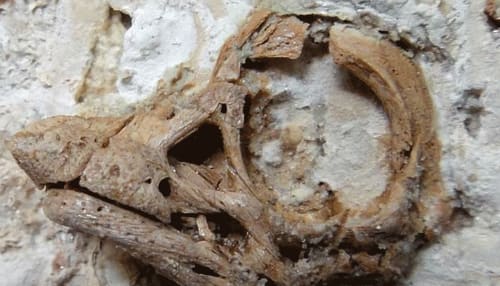- News>
- Science
3D model of an unhatched dinosaur reveals unknown fact about sauropods

The 1.2 inch wide fossil skull of an unhatched dinosaur that was found preserved inside its egg in Patagonia, Argentina.
Highlights
- The fossil is rare and around 80 million-year-old.
- The fossil of the sauropod dinosaurs has tiny embryonic bones to patches of delicate fossilized skin, and even a skull and teeth of one of the creatures.
- The new findings was led by Martin Kundrat of the Paleo BioImaging Lab at Pavol Jozef Šafárik University, in the Slovak Republic.
The 3D scans of a wide fossil of an unhatched dinosaur skull is providing surprising details about baby facial features present in one species from an important dinosaur group called titanosaurs which are said to be the largest land animals that have ever lived on Earth. The 1.2 inch wide fossil skull of an unhatched dinosaur was found preserved inside its egg in Patagonia, Argentina.
The fossil is rare and around 80 million-year-old as per the science alert. The fossil of the sauropod dinosaurs has tiny embryonic bones to patches of delicate fossilized skin, and even a skull and teeth of one of the creatures.
The science alert reported that using a new imaging technology called synchrotron microtomograpy, the researchers were able to produce highly detailed 3D images of the unborn sauropod dinosaur skull, complete with tiny teeth.
While studying the fossil the experts found that they had specialized facial features as hatchlings that changed as they grew into adults. The new findings was led by Martin Kundrat of the Paleo BioImaging Lab at Pavol Jozef Šafárik University, in the Slovak Republic.
"A horned faced and binocular vision are features quite different from what we expected in titanosaurian dinosaurs," said palaeobiologist Martin Kundrát from the Pavol Jozef Šafárik University in Slovakia.
Powerful imaging technology revealed unexpected characteristics including a small horn projecting from the snout as well as eyes facing forward, indicative of binocular vision, said Reuters report.
The facial horn may have helped the dinosaur hatch from its egg like the "egg tooth" present in some hatchling birds and reptiles, but may also have served other functions such as defense or food-gathering, Kundrat said.
The study found that sauropods are large, four-legged, long-necked dinosaurs — were born with a horn and binocular vision that disappeared as they matured.
